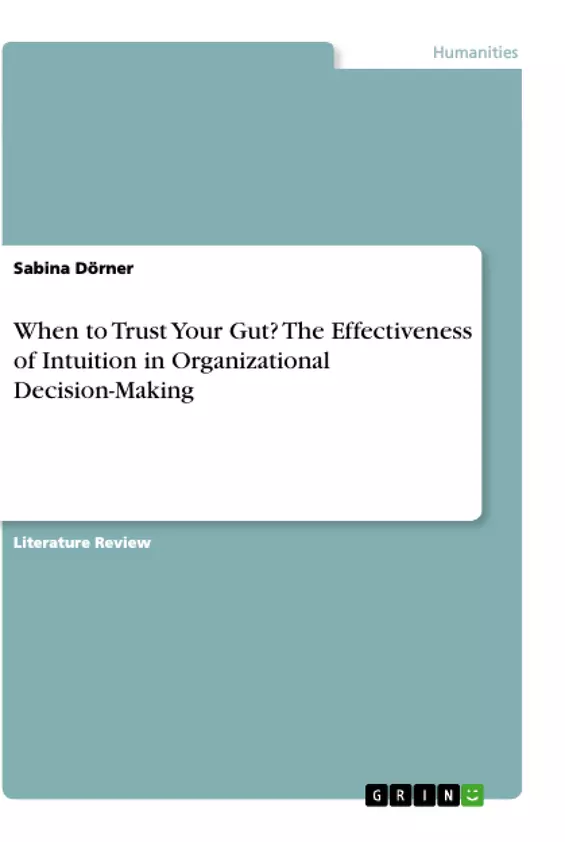This literature review examines the effectiveness of intuitive decision-making in organizations. The use of intuition in organizational decision-making is becoming increasingly common due to complex, fast-moving, ambiguous, and uncertain work conditions in today’s organizations. As a result, managers’ decision-making approaches must adapt to the growing intuitive nature of decisions. Intuitive decision-making yields opportunities to improve the decision effectiveness that can benefit organizations. When intuition is used effectively, it leads to creative, innovative, and qualitative outcomes. Furthermore, the use of intuition allows effective decisions to be made under time constraints and in complex situations. To foster effective intuitive decision-making in organizations, managers must consider the characteristics of the decision-maker, the decision task, and the decision environment in their actions. First, they should create an environment that allows for failure, encourages curiosity, and provide opportunities to make new experiences. Moreover, they should improve their employees' decision-making skills by building their expertise through training, mentoring, and feedback. Finally, managers can enhance the effective use of intuition in their organization by recruiting intuitive individuals based on their personality traits. This paper suggests that managers should acknowledge the presence of intuition in organizational decision-making and take measures to increase its effectiveness to take advantage of its benefits.
Inhaltsverzeichnis (Table of Contents)
- Introduction
- Literature Review
- Intuitive Decision-Making
- Factors Influencing the Effectiveness of Intuitive Decision-Making
- Evidence-based Advice
- Conclusion
- List of references
Zielsetzung und Themenschwerpunkte (Objectives and Key Themes)
This paper aims to investigate the factors influencing the effectiveness of intuitive decision-making in organizational contexts. It examines whether organizations benefit in the long term when employees make decisions intuitively rather than rationally, and derives implications for managers on how to effectively make intuitive decisions.
- Defining and conceptualizing intuitive decision-making, its benefits and limitations in an organizational context
- Analyzing the key factors determining the effectiveness of intuitive decision-making
- Presenting evidence-based advice for managers on how to implement and foster effective intuitive decision-making in organizations
- The impact of organizational structures and processes on decision-making
- The role of intuition in decision-making under uncertainty and time constraints
Zusammenfassung der Kapitel (Chapter Summaries)
- Introduction: This chapter introduces the importance of decision-making in organizations, highlighting the changing organizational landscape and the increasing need for quick and effective decision-making under uncertainty. It emphasizes the limitations of rational decision-making in such environments and the growing role of intuition in decision-making processes.
- Literature Review: This section provides definitions and approaches to conceptualizing intuition in decision-making, placing it in the organizational context and exploring its benefits and limitations. It delves into the factors influencing the effectiveness of intuitive decision-making, laying the groundwork for the paper's central argument.
Schlüsselwörter (Keywords)
Key terms and focus topics in this work include intuitive decision-making, organizational decision-making, decision-making effectiveness, organizational structures and processes, technological advances, societal developments, uncertainty, time constraints, rational decision-making, intuition, cognitive patterns, expertise, benefits of intuition, limitations of intuition, factors influencing effectiveness, and evidence-based advice for managers.
Frequently Asked Questions
When is intuition effective in organizational decision-making?
Intuition is most effective under time constraints, in complex or ambiguous situations, and when the decision-maker possesses high levels of expertise in the relevant field.
How can managers foster effective intuitive decision-making?
Managers should create an environment that allows for failure, encourages curiosity, and provides opportunities for employees to gain diverse experiences and expertise.
What are the limitations of intuitive decision-making?
Intuition can be prone to cognitive biases and may lead to poor outcomes if the decision-maker lacks sufficient experience or if the environment is highly predictable where rational models work better.
Does intuition lead to more creative outcomes?
Yes, when used effectively, intuitive decision-making can yield creative and innovative results that rational, step-by-step processes might overlook.
Should organizations recruit intuitive individuals?
The paper suggests that recruiting individuals with certain personality traits associated with intuition can enhance the overall decision-making effectiveness of an organization.
- Quote paper
- Sabina Dörner (Author), 2021, When to Trust Your Gut? The Effectiveness of Intuition in Organizational Decision-Making, Munich, GRIN Verlag, https://www.grin.com/document/1184297



